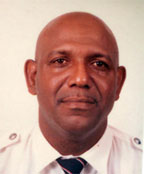`We are not asking you to take guns and run behind the criminal but we are asking you to pass on information to us and let us do the fighting’
Ways of improving policing, community policing and the relationship between the two were discussed at this year’s first Police Outreach Programme yesterday in Kitty.
Commander of Police ‘A’ Division George Vyphuis, Assistant Superintendent of Police Khali Pareshram, and other police representatives from the division met with Kitty residents and members of its Community Policing Group (CPG). Though the entire Kitty community was invited to the session just over 10 persons, exclusive of police ranks, attended.

The Kitty Outreach Programme, Pareshram said during his opening remarks, is the first of its kind to be conducted this year by the Guyana Police Force (GPF). It is also the first such session conducted in Police ‘A’ Division in several years.
Outreach programmes, according to Pareshram, aim to identify GPF’s pitfalls and ways in they can be addressed by both the force and its supporting arms like CPGs.
Currently, Pareshram reported, there are six active CPGs with membership in excess of 100.
Commander Vyphuis later stated that interactions like these are useful and result in “burning issues” being dealt with. Police, Vyphuis said, are a service provider and through interactions with the community they find ways and means to better provide that service.
He also noted that CPGs were more active in Essequibo and Berbice and stressed that they needed to be established and be kept active in the city communities as well. While police have a responsibility to protect they cannot do it without the support of communities, Vyphuis said. Pointing to the police present at yesterday’s gathering Vyphuis told residents that many were from their community.
GPF, the Commander noted, has taken these men and women and trained them for six months. However, it is society which has them from childhood and it is society that is responsible for the greater part of their social development, he said. On this note, Vyphuis highlighted the need for youth groups to be created and maintained in the community and advised that after these groups are created youths can be encouraged to join the Scouts Association.
Residents were then advised that everything said at yesterday’s session would be documented. Vyphuis further informed them that a date would be set for a follow-up session where progress would be reported and feedback taken. This, he said, is the beginning of a long-term relationship between police and the community.
“We want you to help us,” Vyphuis told residents. “We are not asking you to take guns and run behind the criminal but we are asking you to pass on information to us and let us do the fighting.”
Vyphuis told residents that he has an open-door policy and can be accessed on any working day.
“If you come to my office you might have to wait a little but you will get to see me,” the Commander stated.
The fact that residents would feel the need to see a senior officer, Vyphuis further said, indicates that other officials below are not carrying out their functions. This, he promised, will be dealt with.
With regard to the request for suggestion boxes Vyphuis conceded that this was a good idea and said that he would raise it at a higher level since this is not a decision he can take.
Crime Prevention
CPGs, Chairman of the Kitty Crime Prevention Group and CPG Rawle Blyden said, are involved in crime prevention and not crime fighting.
Reiterating some of what Commander Vyphuis said, Blyden stated that CPG members are not expected to take guns and go after criminals, who most likely have more sophisticated weapons. Rather, CPGs must look at ways in which they can prevent crimes in their communities.
Responding to Vyphuis’ statements about youth groups Blyden said that Kitty’s once outstanding youth group became defunct after many of its youths moved to other communities. However, students will be approached in an effort to revive Kitty’s youth group.
The Kitty CPG, he said, will continue conducting patrols on a regular basis.
“I know there are those of you who would prefer if we could patrol day and night but we cannot do this,” Blyden said. “We are a voluntary organization and therefore we get no remuneration.”
